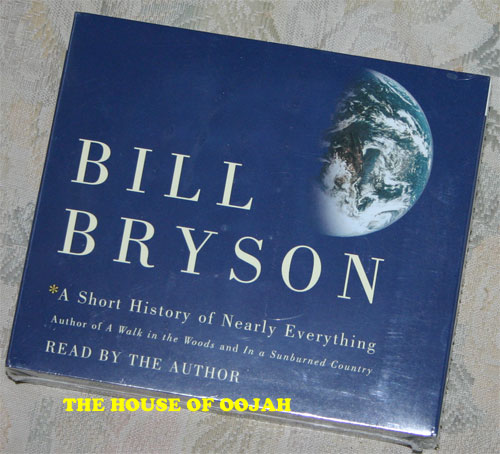A Short History of Nearly Everything - by Bill Bryson - AudioBook-CD- NEW

A Short History of Nearly Everythingby Bill BrysonRead by the AuthorGet The Life and Times of the Thunderbolt Kid by Bill Bryson Audio Book click here |
 |
A Short History of Nearly Everything - Bill Bryson - Audio Book CDBrand New (still shrink wrapped):
Abridged - 6 Hours 5 CDs A Short History of Nearly Everything is a general science audio book by Bill Bryson, which explains some areas of science in ordinary language. It was the bestselling popular science book of 2005 in the UK, selling over 300,000
copies. About the Author Bill BrysonWilliam McGuire "Bill" Bryson, OBE, is a best-selling American author of humorous books on travel, as well as books on the English language and on scientific subjects. He was a resident of North Yorkshire, England, for most of his adult life before moving back to the US in 1995. He has lived in Norfolk, England since 2003. Bill Bryson was born in Des Moines, Iowa, the son of William and Mary Bryson. He has an older brother, Michael, and a sister, Mary Elizabeth. Bryson was educated at Drake University but dropped out in 1972, deciding to backpack around Europe for four months. He returned to Europe the following year with his high-school friend, the pseudonymous Stephen Katz. Some of his experiences from this trip are relived as flashbacks in Neither Here Nor There: Travels in Europe, which documents a similar journey Bryson made twenty years later. Bryson first visited the United Kingdom in 1973 during a tour of Europe, and decided to stay after landing a job working in a psychiatric hospital - the now defunct Holloway Sanatorium in Virginia Water, Surrey. It was there that he met a nurse named Cynthia, whom he eventually married. The couple returned to the USA in 1975 so Bryson could complete his college degree, after which, in 1977, they settled in England, where they remained until 1995. Living in North Yorkshire and mainly working as a journalist, Bryson eventually became chief sub editor of the business section of The Times, and then deputy national news editor of the business section of The Independent. He left journalism in 1987, three years after the birth of his third child. Still living in Yorkshire, Bryson started writing independently and in 1990 their fourth and final child, Sam, was born.
In 1995, Bryson returned to the United States to live in Hanover, New Hampshire for some years, the stories of which feature in his book I'm A Stranger Here Myself, alternatively titled Notes from a Big Country in the United Kingdom and Canada. In 2003, however, the Brysons and their four children returned to England, and now live near Wymondham, Norfolk. Also in 2003, in conjunction with World Book Day, voters in the United Kingdom chose Bryson's book Notes from a Small Island as that which best sums up British identity and the state of the nation. In the same year, he was appointed a Commissioner for English Heritage. In 2004, Bryson won the prestigious Aventis Prize for best general science book with A Short History of Nearly Everything. This 500-page popular literature piece explores not only the histories and current statuses of the sciences, but also reveals their humble and often humorous beginnings. In 2005, the book won the EU Descartes Prize for science communication. Bryson has also written two popular works on the history of the English language — Mother Tongue and Made in America — and, more recently, an update of his guide to usage, Bryson's Dictionary of Troublesome Words (published in its first edition as The Penguin Dictionary of Troublesome Words in 1983). These books were popularly acclaimed and well-reviewed, though they received criticism from academics in the field, who claimed they contained factual errors, urban myths, and folk etymologies. Though Bryson has no formal linguistics qualifications, he is generally a well-regarded writer on the subject of languages. In 2005, Bryson was appointed Chancellor of Durham University, succeeding the late Sir Peter Ustinov, and has been particularly active with student activities, even appearing in a Durham student film: the sequel to The Assassinator and promoting litter picks in the city. He had praised Durham as "a perfect little city" in Notes from a Small Island. He has also been awarded honorary degrees by numerous universities. In 2006, Bryson ran (as part of a celebrity relay team) in the Tresco marathon, the Scillian equivalent of the London marathon. The same year, Frank Cownie, the mayor of Des Moines, awarded Bryson the key to the city and announced that 21 October 2006 would be known as, Bill Bryson - "The Thunderbolt Kid" day. In November 2006, Bryson interviewed Prime Minister Tony Blair on the state of science and education. On 13 December 2006, Bryson was awarded an honorary OBE for his contribution to literature. The following year, he was awarded the James Joyce Award of the Literary and Historical Society of University College Dublin. In January 2007, Bryson was the Schwartz Visiting Fellow of the Pomfret School in Connecticut. In May 2007, he became the President of the Campaign to Protect Rural England. His first area focus in this role was the establishment of an anti-littering campaign across England. He discussed the future of the countryside with Richard Mabey, Sue Clifford, Nicholas Crane and Richard Girling at CPRE's Volunteer Conference in November 2007. |
A Short History of Nearly Everything - Bill Bryson - Audio Book CD |
| Retail: | $49.95 |
| On Sale: | $44.95 |
| You Save: | 11% |
| Stock Info: | Out Of Stock |
| Receive In Stock Notification |

 0 Items (Empty)
0 Items (Empty)
